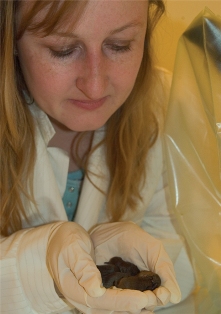 Why Vitamin D Could Prevent Autism
Why Vitamin D Could Prevent AutismResearchers have noticed a link between Vitamin D and ASD for years. A new study explains how a...
 Link between Induced Labor and Autism: New Evidence
Link between Induced Labor and Autism: New EvidenceA study released on Monday found a link between induced or augmented labor, that is, the use...
 Clinical Trial of Oxytocin for Migraines
Clinical Trial of Oxytocin for MigrainesTrigemina, a company focused on creating non-narcotic pain relief drugs, is enrolling patients...
 Men May Be Chemically Wired to Avoid Adultery with Friends' Wives
Men May Be Chemically Wired to Avoid Adultery with Friends' WivesA University of Missouri study found that the testosterone levels of men dropped when they interacted...




 Is oxytocin really evil?
No, oxytocin is not evil. But not all of its effects turn you into an angel of bliss.
Is oxytocin really evil?
No, oxytocin is not evil. But not all of its effects turn you into an angel of bliss.

